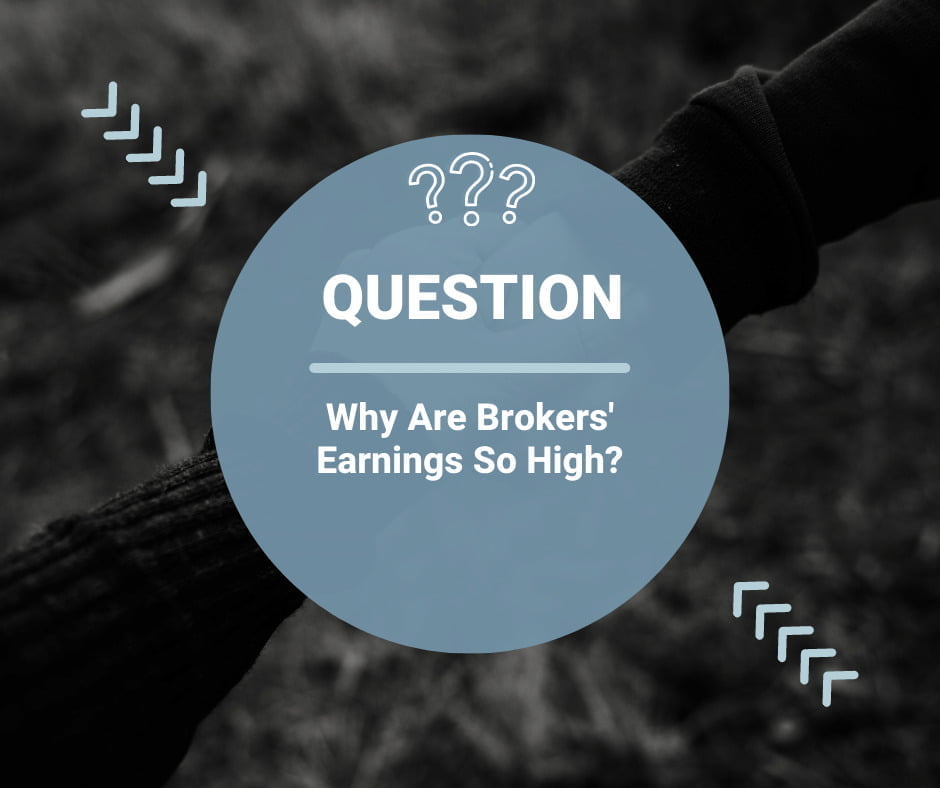Figuring out real estate agents’ average income and salary can seem like trying to capture lightning in a bottle, so we developed tools to break down data and find out exactly how much real estate brokers earn across each state – we bet some figures might even surprise you!
First, Let’s address some misconceptions: brokers are those with higher levels of licensing than salespersons; in some states, a real estate salesperson might even be called a “broker.” Depending on where you reside, you might refer to those with advanced real estate licenses as managing brokers or associate brokers.
Second, real estate agents rarely earn salaries; most work as self-employed contractors earning commissions from property sales as their source of revenue. Here we refer to their total earning as their “salary,” including commissions, fees, brokerage revenues, and splits.
Real Estate Broker FAQs
What is the difference between an agent and a broker regarding real estate transactions?

Brokers come in various varieties. As previously discussed, many states like Colorado, North Carolina, Illinois, Washington, and Indiana refer to real estate agents as brokers. But “broker” can also refer to different roles within real estate brokerage services.
Affiliate Broker
An agent acting as a real estate broker but not managing other agents. Often chosen by experienced real estate professionals looking to work independently without being subjected to large brokerage rules and policies.
Employing or Managing Broker
A licensed real estate agent who oversees day-to-day office operations such as hiring, training, and supervising agents.
Principal, Designated, or Qualified Brokers (also called broker of record and broker-in-charge)
Responsible for assuring compliance with state and federal real estate regulations in every transaction undertaken within their real estate firm; these positions bear considerable liability and responsibility. Typically, most real estate firms’ boss has a designated broker to handle this task.
What Are Broker Earnings?

Real estate agents typically earn income primarily from base salaries and commissions. Real estate brokers tend to source the bulk of their income from brokerage companies which, for them, means the “split,” wherein an agent earns 75% and 25% goes towards commission. A common 75-25 split indicates this situation: when property sales occur, 25% goes directly back into commission for each property sold as the agent receives 25%, and 75%, as usual, goes straight back out of the agent’s account.
Brokerages or brokers can generate revenue by charging monthly desk fees to agents. This fee remains fixed regardless of whether an agent closes a sale. Although technically considered income for brokers, offices typically use these payments to cover recurring expenses like rent, utilities, and technology costs.
Average Broker Annual Earnings

Don’t forget that as an agent, you are uniquely positioned to assist clients with purchasing or selling real estate while receiving the full commission in return.
As several real estate analytics firm’s salary data illustrates, we assemble information from various sources like Indeed, ZipRecruiter Salary.com, Glassdoor, and the National Association of Realtors to create its database of broker salaries. Please keep in mind that these averages may frequently fluctuate depending on factors like whether or not a broker also sells, is the sole owner of their brokerage, splits the commission with their colleagues, or is simply in it for themselves alone – such as local markets and experience levels within real estate industry as a whole.
Why Are Brokers’ Earnings So High (or Low)?

Not seeing results as expected? There could be several explanations as to why.
Data Issues
As it can be challenging to accurately gauge the average income of brokers, salaries data are collected through various methods, including self-reporting and NAR surveys as well as job postings, and can become disorienting when used together with different types of broker income/salaries/types of brokerage services; take all this data with a pinch of salt as your local market, work ethic and potential earnings will determine your total earnings potential.
An Unstable Housing Market
Due to real estate agents being compensated solely based on commission, states with higher sales prices should experience greater incomes for brokers in states that feature big cities with expensive real estate prices – potentially distorting data at the state level upward.
Demand-to-Broker Ratio
In high-demand real estate markets, average salaries tend to increase as competition intensifies. Say a small town in America had an average real estate broker salary of $100,000 while New York City offered a $110,000 median broker salary; one reason these numbers might appear similar might be that an average house sold in Small Town costs just over $175,000 while an equivalent NYC house sells for over $790,000. Furthermore, competition can make things difficult as one small town may only host 30 brokers while 1,760 reside in NYC alone!
Real estate brokers differ considerably in buying and selling, although not necessarily
Real estate agents may represent themselves in real estate transactions, but it isn’t required. Brokers who opt not to sell may prefer instead focusing more on managing and running their business while those representing clients continue making more in direct commissions; the NAR membership profile indicates clearly; that selling has a median annual income of approximately $107,900 while non-selling brokers see median incomes of $93,400 respectively.
Why Should You Apply for Your Broker License?

Earning your broker license may make sense if you want to increase your income and meet requirements in your state while not supervising agents directly. Associate brokers – such as real estate or mortgage broker services – provide many similar advantages without needing to recruit and fire agents directly.
Finding and applying for a license should generally be straightforward. All that’s necessary to obtain one are specific courses and pass a licensing test – both are very manageable tasks that could yield hugely rewarding opportunities!
Pull it Together
Your success as a broker depends entirely upon you. While selling properties can generate more profit than broking them out yourself, earning your broker license could bring added financial and administrative responsibility – both of which could increase earnings substantially.
